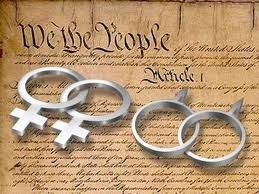The End of DOMA
 I meant to jot some thoughts down last week on the historic fall of DOMA, but it took me longer than I anticipated to actually get those thoughts together. The truth is, I don’t like politics. I find that they make me sad far more often than they fill me with righteous fire. I guess that’s because I pretty readily accept that there will always be people whose minds will not change. And trying to force your will on others rarely ever results in something good and positive.
I meant to jot some thoughts down last week on the historic fall of DOMA, but it took me longer than I anticipated to actually get those thoughts together. The truth is, I don’t like politics. I find that they make me sad far more often than they fill me with righteous fire. I guess that’s because I pretty readily accept that there will always be people whose minds will not change. And trying to force your will on others rarely ever results in something good and positive.
Still, DOMA has saddened me for a long time. Its very name – “Defense of Marriage” – implied that any family I create is a threat to others. And while I understand that there are folks so mystified by same-sex attraction that they simply can’t comprehend that our love is real, I’ve really never understood how a gay relationship serves as a threat to a straight one.
In Colorado, we’ve been somewhat fortunate. A few years ago second-parent adoption was established, allowing two adults of any gender or relation to jointly adopt a child. There are laws here that protect GLBTQ folks from workplace discrimination and violence. Then came the designated beneficiary laws, allowing a person to designate any adult of their choosing with several important rights and duties, like medical decisions when incapacitated and default inheritance rights for anything not covered by a will. Most recently – just this May, in fact – civil unions were passed, and they are now covered by the same establishment and dissolution laws as heterosexual marriages. My own personal most-valued change is that partners may now be added to employer health insurance plans. I’m also excited about the ability to do a legal name change without having to go through the usual extended, expensive court process.
And for me personally, the best part about DOMA is the ability to receive the same tax benefits as any other married couple. But there are hundreds of others that may not affect me personally, but are invaluable to so many other people like me all over the country – the ability to get a green card for one’s foreign-born partner, for example.
I’ve said this before, but as far as I am concerned, a marriage certificate is not what marries two people. It is a legal contract, nothing more – after all, there are plenty of business partnerships that are far more intimate (and permanent.) Two people are married because they SAY SO. Because they’ve committed to sharing a life together. Human beings have been getting married long before the government ever invented the marriage license. And same-sex marriage, or the denial thereof, is not going to stop people from falling in love, sharing a home, and building a family. But the piece of paper – the stupid little piece of paper that doesn’t actually mean anything to the relationship – means EVERYTHING to the security and well-being of that family. It’s not the government’s role to decide what a family should look like. But it is most definitely the government’s role to ensure that every family is protected and honored in the same way. So I am indescribably relieved and overjoyed at this recent turn of events.
“Lucky Number Seven,” the short story I wrote for the paranormal Women of the Dark Streets anthology, derives its title from the two main characters’ relationship. Like me, Kara and Nic live in Denver, where same-sex marriages are not recognized. So, getting legally married in every state that will issue them a license is their “thing.” The story was written shortly after same-sex marriage was granted in New York, so at the time the story opens, Kara and Nic have six marriage licenses and are looking forward to their seventh.
I love the romance of this idea. Nonetheless, I can’t wait for the day when this story is so hopelessly outdated that a reader’s going to have to turn to the history books to figure out why anybody would do that. :P And that day is coming, my friends… It is coming.



